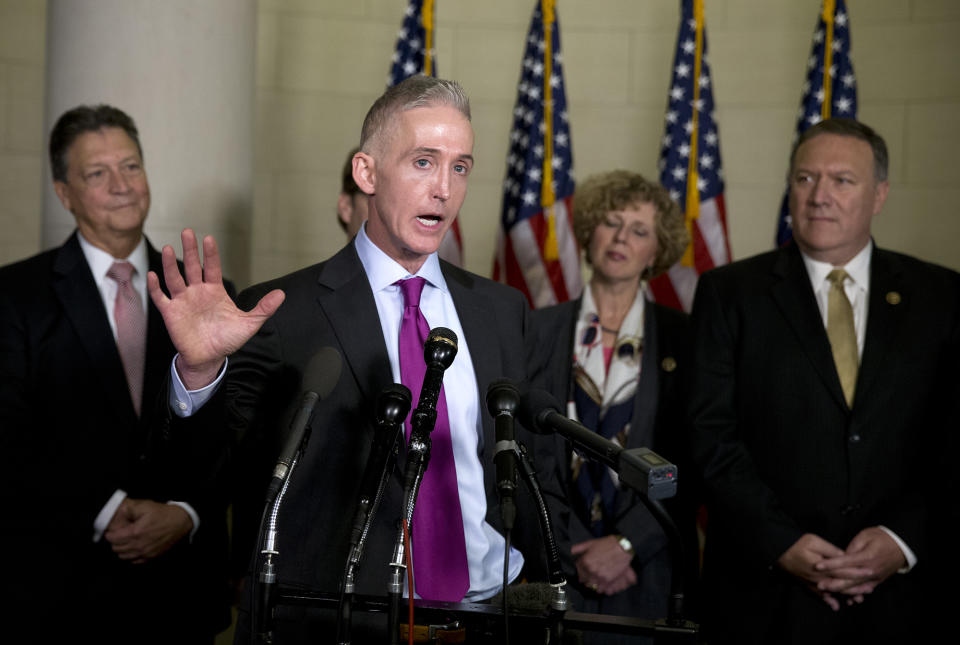State Department email probe slams Hillary Clinton
A report by the State Department inspector general sharply criticizes Hillary Clinton’s use of a private email system, concluding that the former secretary of state violated federal rules and ignored warnings from underlings that she was putting her communications at risk of foreign hacking.
Moreover, the report finds that when two State Department officials raised concerns about Clinton’s exclusive use of a private email server — and that it might be violating federal rules to preserve official records — they were brushed aside by a senior official in Clinton’s office who told them “the matter was not to be discussed any further” and instructed them “never to speak of the Secretary’s personal email system again.”
Rep. Trey Gowdy, R-S.C., the chairman of the committee investigating the 2012 attack on American diplomats in Benghazi, immediately issued a statement saying the findings vindicate his panel’s efforts. But the political impact of the exhaustive 79-page report, which covers the State Department’s use of emails going back to 2001, may be blunted by the disclosure that former Secretary of State Colin Powell also violated some of the same rules by using private emails for work-related business. Between 2001 and 2008, more than 90 department employees “periodically” used private email accounts to conduct official business, it says.
But the report from the State Department’s internal watchdog reserves its harshest criticism for Clinton, noting that as the danger of security risks increased during her tenure department guidance against using private emails became “considerably more detailed and more sophisticated. … Secretary Clinton’s cybersecurity practices accordingly must be evaluated in light of these more comprehensive directives.”
The report notes that neither Clinton nor her former chief of staff, Cheryl Mills, agreed to be interviewed by the inspector general.
A separate investigation by the FBI, focusing on whether Clinton’s email system — hosted on a private server at her home in Chappaqua, N.Y. — potentially exposed national security secrets is expected to wrap up soon.

The report released Wednesday includes new details that undermine some of the Clinton campaign’s justifications for the private email system. It found that the arrangement was “never reviewed or approved” by State Department legal advisers, and it cites several instances in which Clinton was warned by her subordinates against using it. On March 11, 2011, the assistant secretary for diplomatic security emailed Clinton about a “dramatic increase” in attempts by “cyber actors” to “compromise the private home e-mail accounts of senior Department officials.” The “likely objective,” the official told Clinton, was “gain access to policy documents and personal information that could enable technical surveillance and possible blackmail. The personal e-email of family members also is at risk,” the official wrote in the previously undisclosed email.
A statement by the Clinton campaign said the report showed that problems with the State Department’s email system were “longstanding” and predated Clinton’s time as secretary. “While political opponents of Hillary Clinton are sure to misrepresent this report for their own partisan purposes, in reality, the Inspector General documents just how consistent her email practices were with those of other Secretaries and senior officials at the State Department who also used personal email,” said campaign spokesman Brian Fallon. “The report shows that problems with the State Department’s electronic record-keeping systems were longstanding and that there was no precedent of someone in her position having a State Department email account until after the arrival of her successor.
“Contrary to the false theories advanced for some time now, the report notes that her use of personal email was known to officials within the Department during her tenure, and that there is no evidence of any successful breach of the Secretary’s server. We agree that steps ought to be taken to ensure the government can better maintain official records, and if she were still at the State Department, Secretary Clinton would embrace and implement any recommendations, including those in this report, to help do that. But as this report makes clear, Hillary Clinton’s use of personal email was not unique, and she took steps that went much further than others to appropriately preserve and release her records.”
The report contains new evidence that Clinton’s private email server — which had been installed in the basement of her home in Chappaqua, N.Y. — was the target of cyberattacks. On Jan. 9, 2011, an outside adviser who provided technical support to the Clinton email system notified Huma Abedin, Clinton’s deputy chief of staff for operations, that he had to shut down the server because he believed “someone was trying to hack us and while they did not get in I didn’t want to let them have the chance to.” Later that day, the adviser again wrote to Abedin, who was identified only by her title: “We were attacked again so I shut [the server] down for a few min.” The next day, Abedin emailed Clinton’s chief of staff, Cheryl Mills, and another top aide, instructing them not to email Clinton “anything sensitive” and stated that she could “explain more in person.”

In addition to the 2011 warning about security, Clinton was also told that she could be violating rules about preserving internal email communications for federal records. The report found that in 2010, two members of her senior executive staff separately expressed concerns about the private email arrangement. But the director of the Office of the Executive Secretariat for Information Resource Management blew them off, telling one — incorrectly — that department lawyers had approved the system. The two unidentified staffers were forbidden by the director to even bring up the subject. “The Director stated that the mission of [the Executive Secretariat information office] is to support the Secretary and instructed the staff never to speak of the Secretary’s personal email system again,” according to the inspector general report.
The director is not identified by name, but a congressional staffer involved in one of the Clinton email investigations identified him as John Bentel, a now retired career department official. He was questioned by the House Benghazi Committee and said he had “no memory or knowledge” of the issues he was being asked about, and declined a further request to be interviewed by the Senate Judiciary Committee, according to a March letter by the panel’s chairman, Sen. Charles Grassley, to his lawyer. The lawyer, Randy Turk, did not immediately respond to a request for comment.
The report also includes a newly disclosed email that suggests that Clinton was worried that some of her personal communications might become public if she switched to a State Department email system, as some department officials were urging. In November 2010, when Abedin emailed her that “we should talk about putting you on state email or releasing your email address to the department so you are not going to spam,” Clinton replied, “Let’s get separate address or device but I don’t want any risk of the personal being accessible.”
Although Clinton has admitted her exclusive use of a private email server while she was secretary of state was a mistake, she has repeatedly insisted it did not violate any department rules at the time. She has contended that since almost all her work-related emails were exchanged with other government officials on their government accounts, records of them should have been preserved at the other end. “I fully complied with every rule I was governed by,” said Clinton in her initial March 10, 2015, press conference on the matter.
But the State Department inspector general report disputes that flatly noting that the department and officials of the National Archives sent “multiple notices” about the need to preserve work-related emails as government records and “to surrender all federal records prior to department government employment.” It chastises her for keeping private all 55,000 of her emails as secretary when she left the department in early 2013, and returning only about 30,000 of them in response to a request in late 2014, after her use of the system was discovered by Gowdy’s committee. None of the returned emails date from her first few months at the department, the report notes.
“Sending emails from a personal account to other employees at the Department accounts is not an appropriate method of preserving any such emails that would constitute a Federal record,” the report states. “Therefore, Secretary Clinton should have preserved any Federal records she created and received on her personal account by printing and filing those records with the related files in the Office of the Secretary.
“At a minimum, Secretary Clinton should have surrendered all emails dealing with Department business before leaving government service and because she did not do so, she did not comply with the Department’s policies that were implemented in accordance with the Federal Records Act.”

Gowdy was quick to claim credit for setting the investigation in motion, with a statement saying: “There is only one reason why these facts are now available to the American people: thorough congressional oversight, including the Select Committee on Benghazi’s insistence that any truly comprehensive review of what happened before, during, and after the 2012 terrorist attacks in Libya must include public records from the former Secretary of State and her senior staff. While the emails have never been the focus of our investigation, it was necessary to obtain them, and this committee is the first and only one to do so. If anyone wonders why the investigation is not yet complete, the malfeasance and numerous problems identified in this report are Exhibit A, and prove the committee has faced serial delays from day one at the hands of public officials who sought to avoid transparency and accountability.”


